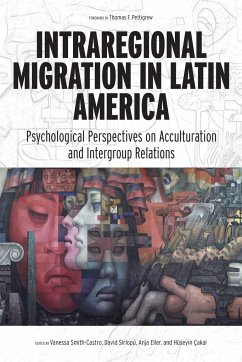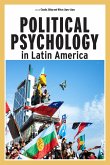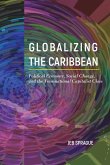Intraregional Migration in Latin America: Psychological Perspectives on Acculturation and Intergroup Relations
Herausgeber: Smith-Castro, Vanessa; Sirlopú, David
Intraregional Migration in Latin America: Psychological Perspectives on Acculturation and Intergroup Relations
Herausgeber: Smith-Castro, Vanessa; Sirlopú, David
- Broschiertes Buch
- Merkliste
- Auf die Merkliste
- Bewerten Bewerten
- Teilen
- Produkt teilen
- Produkterinnerung
- Produkterinnerung
This book addresses the psychosocial causes, consequences, and underpinnings of migration between and within countries in Central and South America, including Chile, Argentina, Bolivia, Costa Rica, Mexico, Peru, and Brazil.
Andere Kunden interessierten sich auch für
![Political Psychology in Latin America Political Psychology in Latin America]() Political Psychology in Latin America70,99 €
Political Psychology in Latin America70,99 €![Globalizing the Caribbean Globalizing the Caribbean]() Jeb SpragueGlobalizing the Caribbean31,99 €
Jeb SpragueGlobalizing the Caribbean31,99 €![Parcels: Memories of Salvadoran Migration Parcels: Memories of Salvadoran Migration]() Mike AnastarioParcels: Memories of Salvadoran Migration35,99 €
Mike AnastarioParcels: Memories of Salvadoran Migration35,99 €![Brazilian Bourgeoisie and Foreign Policy Brazilian Bourgeoisie and Foreign Policy]() Tatiana BerringerBrazilian Bourgeoisie and Foreign Policy26,99 €
Tatiana BerringerBrazilian Bourgeoisie and Foreign Policy26,99 €![Women's Empowerment and Disempowerment in Brazil: The Rise and Fall of President Dilma Rousseff Women's Empowerment and Disempowerment in Brazil: The Rise and Fall of President Dilma Rousseff]() Pedro A. G. Dos SantosWomen's Empowerment and Disempowerment in Brazil: The Rise and Fall of President Dilma Rousseff28,99 €
Pedro A. G. Dos SantosWomen's Empowerment and Disempowerment in Brazil: The Rise and Fall of President Dilma Rousseff28,99 €![The Poor's Struggle for Political Incorporation The Poor's Struggle for Political Incorporation]() Federico M. RossiThe Poor's Struggle for Political Incorporation32,99 €
Federico M. RossiThe Poor's Struggle for Political Incorporation32,99 €![The Four Deportations of Jean Marseille The Four Deportations of Jean Marseille]() Jean MarsielleThe Four Deportations of Jean Marseille11,99 €
Jean MarsielleThe Four Deportations of Jean Marseille11,99 €-
-
-
This book addresses the psychosocial causes, consequences, and underpinnings of migration between and within countries in Central and South America, including Chile, Argentina, Bolivia, Costa Rica, Mexico, Peru, and Brazil.
Produktdetails
- Produktdetails
- Psychology in Latin America
- Verlag: American Psychological Association (APA)
- Seitenzahl: 269
- Erscheinungstermin: 16. März 2021
- Englisch
- ISBN-13: 9781433833809
- ISBN-10: 1433833808
- Artikelnr.: 60885954
- Herstellerkennzeichnung
- Libri GmbH
- Europaallee 1
- 36244 Bad Hersfeld
- gpsr@libri.de
- Psychology in Latin America
- Verlag: American Psychological Association (APA)
- Seitenzahl: 269
- Erscheinungstermin: 16. März 2021
- Englisch
- ISBN-13: 9781433833809
- ISBN-10: 1433833808
- Artikelnr.: 60885954
- Herstellerkennzeichnung
- Libri GmbH
- Europaallee 1
- 36244 Bad Hersfeld
- gpsr@libri.de
Vanessa Smith-Castro earned her PhD in Social Psychology from Philipps-Universität Marburg (Germany). She is full professor¿ at the Institute for Psychological Research of the University of Costa Rica. Her research interests are social cognition¿, intergroup relations, acculturation, and the social psychology of health. David Sirlopú is an assistant professor in the Faculty of Psychology at Universidad del Desarollo (Concepción, Chile). His research interests are intergroup relations and acculturation processes of Latina America immigrants and majority society. He also conducts research involving respect as recognition in minority groups, and subjective well-being in children and adolescents. Anja Eller (1974-2019) was professor of Social Psychology at the National Autonomous University of Mexico. She was broadly interested intergroup relations, intergroup contact, identity and categorization, and embarrassment. Hüseyin Çakal holds an MSc in Sociology from the University of Manchester and a DPhil in Social Psychology from the University of Oxford. He is a lecturer in Psychology at the University of Keele. His research investigates intergroup contact, social identity processes, collective action, and mental health among severely disadvantaged communities.
Foreword
Thomas F. Pettigrew
Introduction: Intraregional Migration in Latin America From a Psychological
Perspective
Vanessa Smith-Castro, David Sirlopú, Anja Eller, and Hüseyin Çakal
Part I. Intercultural Contact and Acculturation
Chapter 1. South-South Migration in Chile: Well-Being and Intergroup
Relations Between Latin-American Immigrants and Host Society Members
María José Mera-Lemp, Gonzalo Martínez-Zelaya, Marian Bilbao, and Aracely
Orellana
Chapter 2. Acculturation Strategies and Multicultural Identity in Bolivia:
Influences of a Plural Society
Eric Roth and Adriana Méndez
Chapter 3. Acculturation in International Students in Argentina: Factors
That Predict Adaptation
Alejandro Castro Solano and María Laura Lupano Perugini
Chapter 4. My Home, My Rules: Costa Rican Attitudes Toward Immigrants and
Immigration
Vanessa Smith-Castro, Eugenia Gallardo-Allen, and Mauricio Molina-Delgado
Part II. Intergroup Relations and Social Change
Chapter 5. Exploring Discrimination and Prejudice in Education:
Contributions From Social Psychology to the Immigrant Phenomenon in Chile
Natalia Salas, Dante Castillo, David Huepe, Luis Eduardo Thayer Correa, and
Felipe Kong
Chapter 6. Disadvantage, Contact, and Health Among Indigenous People in
Mexico and Chile
Anja Eller, Hüseyin Çakal, and David Sirlopú
Chapter 7. Socio-Ideological Beliefs and Perspective Taking Versus the
Two-Headed Dragon: A Latin American Prejudice Story, as Told in Argentina
Carlos M. Díaz-Lázaro, Jeremías D. Tosi, Luz M. Castro, and Carolina E.
Borgeat-Linares
Chapter 8. "What Brings Us Together and Sets Us Apart": Regional Identities
and Intergroup Relations as the Basis of Peruvian National Identity in
Samples from Ayacucho and Lima
Rosa María Cueto, Agustín Espinosa, and Harry Lewis
Chapter 9. “They Are Close to Us, but We Are So Different From Them”:
Prejudice Toward Immigrants and Indigenous Peoples in Brazil
Valdiney V. Gouveia, Rafaella C. R. Araújo, and Taciano L. Milfont
Conclusion: Implications for Future Research
Vanessa Smith-Castro, David Sirlopú, Anja Eller, and Hüseyin Çakal
Thomas F. Pettigrew
Introduction: Intraregional Migration in Latin America From a Psychological
Perspective
Vanessa Smith-Castro, David Sirlopú, Anja Eller, and Hüseyin Çakal
Part I. Intercultural Contact and Acculturation
Chapter 1. South-South Migration in Chile: Well-Being and Intergroup
Relations Between Latin-American Immigrants and Host Society Members
María José Mera-Lemp, Gonzalo Martínez-Zelaya, Marian Bilbao, and Aracely
Orellana
Chapter 2. Acculturation Strategies and Multicultural Identity in Bolivia:
Influences of a Plural Society
Eric Roth and Adriana Méndez
Chapter 3. Acculturation in International Students in Argentina: Factors
That Predict Adaptation
Alejandro Castro Solano and María Laura Lupano Perugini
Chapter 4. My Home, My Rules: Costa Rican Attitudes Toward Immigrants and
Immigration
Vanessa Smith-Castro, Eugenia Gallardo-Allen, and Mauricio Molina-Delgado
Part II. Intergroup Relations and Social Change
Chapter 5. Exploring Discrimination and Prejudice in Education:
Contributions From Social Psychology to the Immigrant Phenomenon in Chile
Natalia Salas, Dante Castillo, David Huepe, Luis Eduardo Thayer Correa, and
Felipe Kong
Chapter 6. Disadvantage, Contact, and Health Among Indigenous People in
Mexico and Chile
Anja Eller, Hüseyin Çakal, and David Sirlopú
Chapter 7. Socio-Ideological Beliefs and Perspective Taking Versus the
Two-Headed Dragon: A Latin American Prejudice Story, as Told in Argentina
Carlos M. Díaz-Lázaro, Jeremías D. Tosi, Luz M. Castro, and Carolina E.
Borgeat-Linares
Chapter 8. "What Brings Us Together and Sets Us Apart": Regional Identities
and Intergroup Relations as the Basis of Peruvian National Identity in
Samples from Ayacucho and Lima
Rosa María Cueto, Agustín Espinosa, and Harry Lewis
Chapter 9. “They Are Close to Us, but We Are So Different From Them”:
Prejudice Toward Immigrants and Indigenous Peoples in Brazil
Valdiney V. Gouveia, Rafaella C. R. Araújo, and Taciano L. Milfont
Conclusion: Implications for Future Research
Vanessa Smith-Castro, David Sirlopú, Anja Eller, and Hüseyin Çakal
Foreword
Thomas F. Pettigrew
Introduction: Intraregional Migration in Latin America From a Psychological
Perspective
Vanessa Smith-Castro, David Sirlopú, Anja Eller, and Hüseyin Çakal
Part I. Intercultural Contact and Acculturation
Chapter 1. South-South Migration in Chile: Well-Being and Intergroup
Relations Between Latin-American Immigrants and Host Society Members
María José Mera-Lemp, Gonzalo Martínez-Zelaya, Marian Bilbao, and Aracely
Orellana
Chapter 2. Acculturation Strategies and Multicultural Identity in Bolivia:
Influences of a Plural Society
Eric Roth and Adriana Méndez
Chapter 3. Acculturation in International Students in Argentina: Factors
That Predict Adaptation
Alejandro Castro Solano and María Laura Lupano Perugini
Chapter 4. My Home, My Rules: Costa Rican Attitudes Toward Immigrants and
Immigration
Vanessa Smith-Castro, Eugenia Gallardo-Allen, and Mauricio Molina-Delgado
Part II. Intergroup Relations and Social Change
Chapter 5. Exploring Discrimination and Prejudice in Education:
Contributions From Social Psychology to the Immigrant Phenomenon in Chile
Natalia Salas, Dante Castillo, David Huepe, Luis Eduardo Thayer Correa, and
Felipe Kong
Chapter 6. Disadvantage, Contact, and Health Among Indigenous People in
Mexico and Chile
Anja Eller, Hüseyin Çakal, and David Sirlopú
Chapter 7. Socio-Ideological Beliefs and Perspective Taking Versus the
Two-Headed Dragon: A Latin American Prejudice Story, as Told in Argentina
Carlos M. Díaz-Lázaro, Jeremías D. Tosi, Luz M. Castro, and Carolina E.
Borgeat-Linares
Chapter 8. "What Brings Us Together and Sets Us Apart": Regional Identities
and Intergroup Relations as the Basis of Peruvian National Identity in
Samples from Ayacucho and Lima
Rosa María Cueto, Agustín Espinosa, and Harry Lewis
Chapter 9. “They Are Close to Us, but We Are So Different From Them”:
Prejudice Toward Immigrants and Indigenous Peoples in Brazil
Valdiney V. Gouveia, Rafaella C. R. Araújo, and Taciano L. Milfont
Conclusion: Implications for Future Research
Vanessa Smith-Castro, David Sirlopú, Anja Eller, and Hüseyin Çakal
Thomas F. Pettigrew
Introduction: Intraregional Migration in Latin America From a Psychological
Perspective
Vanessa Smith-Castro, David Sirlopú, Anja Eller, and Hüseyin Çakal
Part I. Intercultural Contact and Acculturation
Chapter 1. South-South Migration in Chile: Well-Being and Intergroup
Relations Between Latin-American Immigrants and Host Society Members
María José Mera-Lemp, Gonzalo Martínez-Zelaya, Marian Bilbao, and Aracely
Orellana
Chapter 2. Acculturation Strategies and Multicultural Identity in Bolivia:
Influences of a Plural Society
Eric Roth and Adriana Méndez
Chapter 3. Acculturation in International Students in Argentina: Factors
That Predict Adaptation
Alejandro Castro Solano and María Laura Lupano Perugini
Chapter 4. My Home, My Rules: Costa Rican Attitudes Toward Immigrants and
Immigration
Vanessa Smith-Castro, Eugenia Gallardo-Allen, and Mauricio Molina-Delgado
Part II. Intergroup Relations and Social Change
Chapter 5. Exploring Discrimination and Prejudice in Education:
Contributions From Social Psychology to the Immigrant Phenomenon in Chile
Natalia Salas, Dante Castillo, David Huepe, Luis Eduardo Thayer Correa, and
Felipe Kong
Chapter 6. Disadvantage, Contact, and Health Among Indigenous People in
Mexico and Chile
Anja Eller, Hüseyin Çakal, and David Sirlopú
Chapter 7. Socio-Ideological Beliefs and Perspective Taking Versus the
Two-Headed Dragon: A Latin American Prejudice Story, as Told in Argentina
Carlos M. Díaz-Lázaro, Jeremías D. Tosi, Luz M. Castro, and Carolina E.
Borgeat-Linares
Chapter 8. "What Brings Us Together and Sets Us Apart": Regional Identities
and Intergroup Relations as the Basis of Peruvian National Identity in
Samples from Ayacucho and Lima
Rosa María Cueto, Agustín Espinosa, and Harry Lewis
Chapter 9. “They Are Close to Us, but We Are So Different From Them”:
Prejudice Toward Immigrants and Indigenous Peoples in Brazil
Valdiney V. Gouveia, Rafaella C. R. Araújo, and Taciano L. Milfont
Conclusion: Implications for Future Research
Vanessa Smith-Castro, David Sirlopú, Anja Eller, and Hüseyin Çakal








